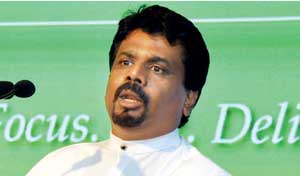Monday Mar 02, 2026
Monday Mar 02, 2026
Thursday, 4 August 2016 00:30 - - {{hitsCtrl.values.hits}}
Delivering hard truths, the Janatha Vimukthi Peramuna (JVP) yesterday gave insightful analysis on inconsistent Government policies that had previously destroyed public companies through privatisation which made the public wary of privatisation. 
Taking a candid and eloquent approach to the key economic concerns currently gripping Sri Lanka, Janatha Vimukthi Peramuna (JVP) leader Anura Kumara Dissanayake told the gathering at the Sri Lanka Economic Summit 2016 that the public had genuine concerns over Government plans as they were not clearly communicated and were not underpinned by effective implementation.
“We want the private sector to engage with us directly,” Dissanayake told the private sector, breaking down economic concerns to five areas of debt, reduction of exports, income inequality, trade deficit and politicisation.
“We understand that the Government has to find solutions to repay debt. But we must also remember that Sri Lanka has a small economy and in such a constrained space it is very easy to set up monopolies that will negatively impact the poor. This is why we feel that at key levels State intervention is necessary to regulate the market.”
Taking the example of rice, Dissanayake pointed out that the dominance of two companies was driving up the price of rice while driving down the price of paddy, resulting in both the farmer and the consumer suffering. However, he acknowledged that JVP would support the offloading of non-essential public enterprises that were not directly improving the living standard of the poor.
“The Prime Minister has said in Parliament that 43% of Sri Lanka’s population lives on less than Rs. 200 a day. What a terrible indictment of the development of this country. How can your businesses be sustained or developed in such an environment? These are issues that need to be seriously considered.”
Dissanayake defended the masses resistance to privatisation by pointing out that while the Government was keen to recall the successful privatisation of Sri Lanka Telecom (SLT) they were averse to talk about numerous ventures such as the Sevanagala and Kanthale sugar plantations, Kankasanthurai cement factory, paper mills and handloom factories in Pugoda; all of which went into bankruptcy after privatisation.
“The public have logical concerns because they have seen these bad experiences. That is why they are against privatisation. This Government talks about sweeping reform but has failed to even put together a clear Budget. There are huge implementation bottlenecks. Forget a five-year plan, give us a Budget that can be followed for just one year without amendments,” he told Foreign Minister Mangala Samaraweera and Development Strategies and International Trade Minister Malik Samarawickrama.